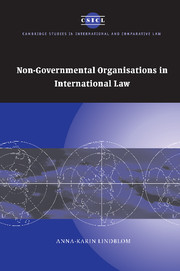Book contents
- Frontmatter
- Contents
- Acknowledgements
- List of abbreviations
- Part I Theoretical framework
- Part II Legal and empirical survey
- 4 Rights and obligations
- 5 Standing before international judicial and quasi-judicial bodies
- 6 Non-party participation before judicial and quasi-judicial bodies
- 7 Co-operation with intergovernmental organisations
- 8 Participation in international conferences
- 9 Agreements with states and intergovernmental organisations
- Part III Conclusion
- Bibliography
- Interviews
- Index
- CAMBRIDGE STUDIES IN INTERNATIONAL AND COMPARATIVE LAW
6 - Non-party participation before judicial and quasi-judicial bodies
Published online by Cambridge University Press: 12 August 2009
- Frontmatter
- Contents
- Acknowledgements
- List of abbreviations
- Part I Theoretical framework
- Part II Legal and empirical survey
- 4 Rights and obligations
- 5 Standing before international judicial and quasi-judicial bodies
- 6 Non-party participation before judicial and quasi-judicial bodies
- 7 Co-operation with intergovernmental organisations
- 8 Participation in international conferences
- 9 Agreements with states and intergovernmental organisations
- Part III Conclusion
- Bibliography
- Interviews
- Index
- CAMBRIDGE STUDIES IN INTERNATIONAL AND COMPARATIVE LAW
Summary
Introduction
The international legal system can be seen as a set of bilateral consensual relationships within which rights and obligations are formulated and values allocated between the parties. There is a correlation between rights and duties, as in Hohfeld's systematisation, although one and the same party may have the same claim or obligation towards several parties. Such bilateralism brings order to the appearance of the law, not only because it identifies who is the holder of a right, but also who may enforce it. At the same time, international agreements and disputes often affect the interests of third states, nations or groups, or of the international community as a whole. Hermann Mosler suggests that:
International law cannot be defined solely in terms of bilateral or multilateral relations between subjects which possess legal capacity. The collection of subjects participating in the international legal order constitutes a community living according to common rules of conduct.
Interests which affect actors other than the parties might be of many different kinds – material interests in economic values or natural resources, or more political interests in legal developments in one direction or another, such as protection of the environment or respect of human rights standards.
The fact that the interests of many are affected by a bilateral and multilateral legal relationship raises issues about who may intervene or otherwise make submissions during international judicial proceedings.
- Type
- Chapter
- Information
- Non-Governmental Organisations in International Law , pp. 300 - 365Publisher: Cambridge University PressPrint publication year: 2006



